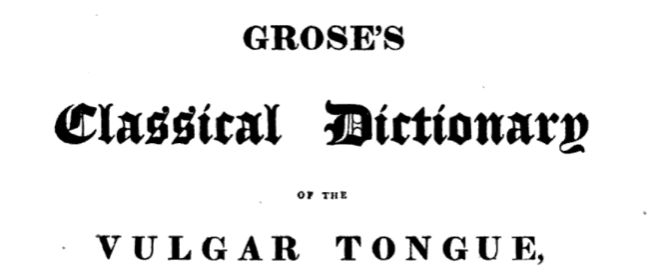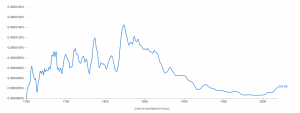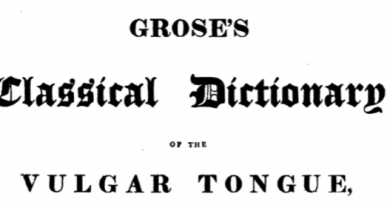Dictionary of the Vulgar Tongue – Day 269, 270 and 271
The Dictionary of the Vulgar Tongue was first published at the end of the eighteenth century, and given that the current health crisis is giving too much time to read books, I thought I’d pick a daily word from it until I got bored…. And to catch up after getting behind with these posts, and because I’m getting towards the end of the book, I’m doing three days at once now. How lovely….
Pursy
This is defined by Grose as “short-breathed, or foggy, from being over fat”. From the French ‘pousser’ to mean to breathe with difficulty, the word evolved to ‘pursif’ in Middle English. It was used not just to describe people who were overweight, but also horses who suffered from problems with breathing.
The word is now archaic, having started to fall out of usage by the end of the nineteenth century.
Quakers
I sense a slight lack of respect with how Grose defines this, namely “a religious sect so called from their agitations in preaching”. The word origin is still unclear, for some it comes from when members would “tremble in the way of the Lord”. Others have said it evolved from how the established Church of England trembled with the threat of this new religious thought and others that when the Quakers were being taken through the courts that it was said the Judge would quake with fear on Judgement Day.
The official name wasn’t the Quakers, but the Religious Society of Friends and the likely origin of the word is something to do with religious fervour as other groups had been referred to in a similar way in the past. Initially the word quaker was used in a derogatory manner, but over time the usage became more positive and it’s now used by the Religious Society of Friends themselves.
Queen Dick
I’ve never heard of this phrase, defined as “to the tune of the life and death of Queen Dick. That happened in the reign of Queen Dick: ie, never”. It was also a nickname given to Richard Cromwell, although not in a positive manner, when he was the Lord Protector of the Commonwealth of England, Scotland and Ireland. The phrase doesn’t seem to have ever been in common usage, since it doesn’t appear on Google Ngram, and it seems that the “when pigs fly” alternative (which was also in usage in the time of Grose) instead entered the vernacular.



